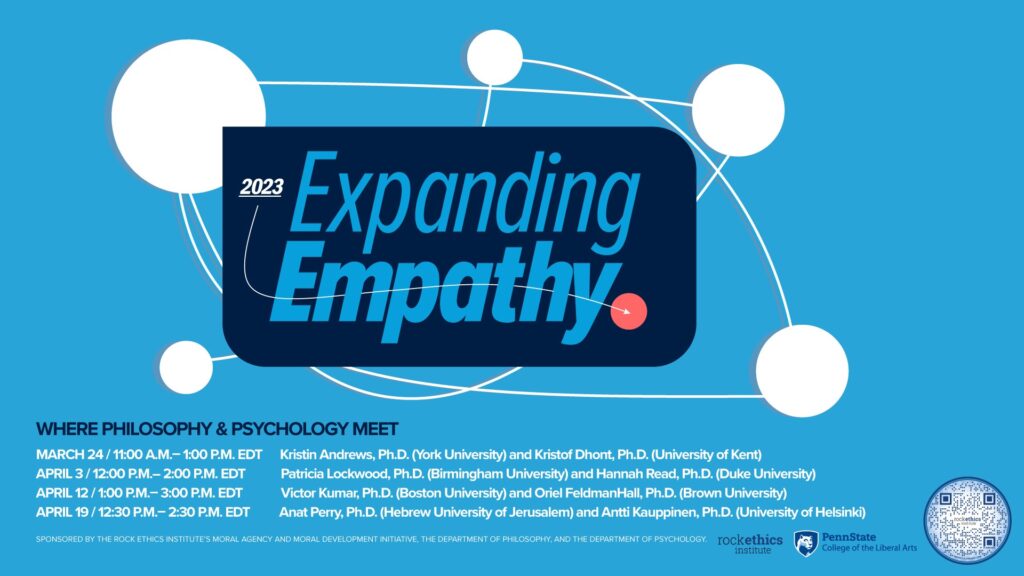Expanding Empathy Speaker Series: Empathy, Effort, and Common Ground

Patricia Lockwood, Ph.D., is a Sir Henry Dale Fellow and Jacobs Foundation Research Fellow at the University of Birmingham. She was previously a junior research fellow at Christ Church and Somerville College, University of Oxford, and a Medical Research Council Fellow at the University of Birmingham, University of Oxford and University of Zurich. She holds a Ph.D. in psychology from University College London and a B.Sc. in psychology and philosophy from the University of Bristol. Her lab investigates social learning and decision-making across the lifespan and in neurological and psychiatric disorders using a mixture of computational modelling, behavioural measures, self report, patient studies and neuroimaging. Her work has received multiple awards (S4SN Early Career Award, APS Award for Transformative Early Career Contributions).
LECTURE TITLE: “How Willing Are We to Put in Effort to Help Others? Prosocial Motivation across the Lifespan and in the Brain”
ABSTRACT: Many of our prosocial actions require effort. From holding doors open for strangers to helping out colleagues with their work. Effortful prosocial actions are also essential for addressing global challenges, from climate change to ageing populations. However, the computational and neural mechanisms for how and why we choose to help remain poorly understood.
I will present recent work that examines how willing we are to incur costs to help others. I will show that there are important differences in these processes as we grow older. Next, I will present a study probing the neural basis of prosocial motivation using computational modelling and functional neuroimaging. This work shows that different aspects of prosocial motivation can be distinguished by signals in brain areas that are domain general and domain specific for social processing. Finally, I will discuss recent work that has examined prosocial preferences and age on a global scale to show that differences in prosocial behaviour in older adults are similar around the world.

Hannah Read, Ph.D., is currently a researcher at Duke University, where she is engaged in a series of projects concerning the ethics of artificial intelligence as well as the effects of human-human and human-computer interactions on empathy. Previously, she was a postdoctoral fellow at Wake Forest University, as well as a UX research and ethics consultant for AnswerLab. She received her Ph.D. in philosophy from Duke University, her M.A. in philosophy from Tufts University, and her B.A. in philosophy and literary studies from The New School.
LECTURE TITLE: “The Benefits of Risk of Empathy and Common Ground”
ABSTRACT: Empathy is widely recognized for its role in promoting a range of prosocial behaviors, including in even the most challenging contexts such as those marked by so-called affective polarization. Indeed, when properly motivated, empathy in these contexts can be a powerful tool for bringing polarized opponents together, helping them to find common ground, forge and sustain positive relationships, listen and learn from one another, and cooperate toward joint goals. At the same time, there are real ethical risks to empathizing for these important purposes. These include the risks of: (1) obscuring valuable differences between oneself and a polarized opponent, thereby inhibiting appropriate responsiveness to such differences; (2) submitting oneself to unnecessary (physical and psychological) harm; and (3) fueling intergroup hostility and antagonism when finding common ground across one group divide involves increasing hostility across another. In this talk, I explore the relationship between the ethical risks and benefits of empathizing and finding common ground. I consider the contextual factors that speak in favor and against empathizing and finding common ground with polarized opponents and argue that decisions about how to weigh such factors must be made by individuals on a case-by-case basis.
